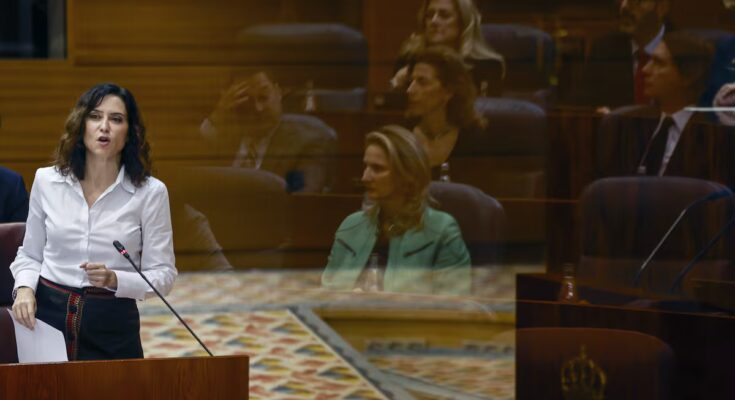The Independent Fiscal Authority (Airef) warns in a November 5 report on the “negative impact of the permanent tax reduction measures” that the various PP governments have been carrying out in the Community of Madrid since 2004. After examining the budget execution and public debt of the region, in addition to the economic-financial plan (PEF) of the executive of Isabel Díaz Ayuso (PP) for the period 2025-2026, the fiscal authority also warns of the “risk of failure to comply (in 2025 and 2026) with the spending rule”, a budgetary discipline tool that links the growth of public spending to the financing capacity of each administration. This forecast can be extended to the central administration (2025) and to most regions (2025 and 2026), and is conditioned, the institution recalls, “by the current context of uncertainty on the fiscal rules applicable in 2026”, attributable to the central government of Pedro Sánchez (PSOE). Finally, the organization is committed to a good medium-term evolution of Madrid’s economy, since the Community is one of the least indebted regions and one of the few that respects the debt/GDP ratio (13%).
“In the report of July 16, Airef once again assessed the risk of non-compliance with the spending rule in 2025, which is also observed for 2026,” reads the assessment, signed by Cristina Herrero Sánchez, president of the Revenue Agency. “Considering the execution of expenditure to date, the negative impact of the permanent tax reduction measures and the uncertainty regarding the implementation and timing of the effects of the savings measures included in the PEF (economic-financial plan), the Airef (…) recommended to the Community of Madrid to integrate in the Plan presented to the Council of Fiscal and Financial Policy (CPFF) measures sufficient to support the growth forecasts of computable expenditure adjusted to the reference rates for the entire period (…); and that the plan include balance and debt estimates compatible with this growth.”
To respond to Airef’s proposal, Madrid proposed to increase the tariff for the coverage of the fire prevention and fire prevention and rescue service, to increase its revenue by 13 million euros per year starting from 2026. It also calculated savings of hundreds of millions due to the moderation in the growth of pharmaceutical spending and health products. And he put forward the decision to “freeze” in 2025 and 2026 investments that are not linked to the City of Justice or to the funds of the Recovery, Transformation and Resilience Plan. A measure valued at 60 million less in spending.
But the supervisory body is not satisfied with these changes, among other things because they are still accompanied by tax cuts of more than 60 billion euros since 2004, which the PP claims to have compensated for with the increased collection that the regional treasury would have thanks to its energizing effect on the economy. Looking to the next few years, Airef reminds us, around 300 million will be added to this account due to the new tax cuts decided by the Díaz Ayuso government, which will not prevent tax revenues from growing by 1%, according to the financial administration, “conditioned by the tax reduction of the inheritance and gift tax”.
“First of all, Airef, in the report, underlines that the medium-term prospects of the Community of Madrid are very favourable” and, in particular with regards to 2026, that “the current context of uncertainty on fiscal rules conditions the analysis of the report”, recalls a spokesperson for the Ministry of Economy, Labor and Finance, directed by Rocío Albert. “And all this is due to the negligence of the central government, which not only has not presented its budgets, but is torpedoing the accounts of all the autonomous communities by not convening the Fiscal and Financial Policy Council to set the objectives of budget stability and public debt: essential objectives to be able to prepare the budgets” he claims.
And he adds: “As for the negative impact of the tax reduction, it must be taken into account that the Airef report does not take into account the effects of tax savings on the economy, and that, in the Community of Madrid, it has translated into a significant increase in tax collection, relaunching the economy and employment and thus increasing the taxpayer base.”
Formula 1
The regional government claims that the 1,554.7 million euros that will be allocated for investments will finance the expansion of line 11 of the Madrid metro, the City of Justice and the City of Health. Furthermore, Airef itself estimates that there will be a greater increase in revenue than that calculated by the Community itself: 7% in 2026, reaching 9.6% of GDP. At the same time, expenses would increase by 3%, equal to 9.5% of GDP, according to the tax authorities, a figure that once again exceeds the balance forecast by Madrid in this section.
“The Airef warns against an unbalanced and regressive fiscal model, supported by the propaganda of tax cuts and not social justice. Madrid needs a fair tax system and efficient public management, no more privileges for the few”, says Mar Espinar, spokesperson for the socialists in the Madrid Assembly. “The Ayuso government prefers to cut social spending and boast a balanced budget rather than review tax cuts for the rich, millionaire payments to private companies or stop waste in projects like Formula 1,” he adds. And he warns: “The tax cuts (for 2026) will remove more than 300 million euros from public revenues, limiting the capacity to invest in healthcare, education or housing.”
The Community of Madrid Expenditure Budget for 2026 amounts, in national accounts terms, to 30,663.6 million euros, which represents an increase of 6.98% compared to the initial Budget for 2025.
The project will be approved with absolute certainty, as the Ayuso government is supported by the absolute majority of the PP in the Regional Assembly.



